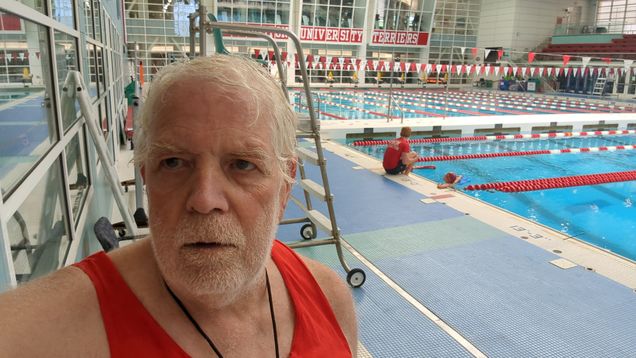From Lab to Lifeguard Chair
Professor of Biology Tom Gilmore subs in at the FitRec pool
Professor of Biology Tom Gilmore subs in at the FitRec pool
A few times a week, in the middle of the work day, Tom Gilmore, professor of Biology and director of the graduate program in Molecular Biology, Cell Biology & Biochemistry, rushes out of his lab in 24 Cummington Mall to work as a lifeguard at the Boston University Fitness & Recreation Center.
 Gilmore, 70, who studies immunology, started lifeguarding at the FitRec pool about two years ago, when he learned that there was a local — and national — shortage of lifeguards. An avid swimmer, Gilmore noticed during his near-daily swims that FitRec managers were working as lifeguards.
Gilmore, 70, who studies immunology, started lifeguarding at the FitRec pool about two years ago, when he learned that there was a local — and national — shortage of lifeguards. An avid swimmer, Gilmore noticed during his near-daily swims that FitRec managers were working as lifeguards.
“They told me that they couldn’t get lifeguards,” Gilmore said. “I said, ‘I’ll do it. Train me.’ So that’s how it started. I felt like I was giving back a little bit to this facility I was using all the time.”
So Gilmore enrolled in BU’s American Red Cross Lifeguard Certification course — nine three-hour sessions that included class time, pool time, written tests, and in-water swimming and rescue tests. There were about 20 students in the class, mostly high school and college students. “I’m definitely the oldest lifeguard,” he said.

Gilmore started swimming around 40 years ago, as a graduate student in biology at the University of California at Berkeley. When he was younger, he competed in triathlons. Last summer, he took part in the Alcatraz Swim, an approximately two-mile swim from Alcatraz Island to San Francisco. He also swims most years in the annual Charles River one-mile swim by the Esplanade, which is held to raise money for the Charles River Conservancy.“I find it so liberating and fascinating to be in open water,” Gilmore said. “I think I get some of my best ideas when I’m swimming.”

Since arriving at BU in 1987, Gilmore, who is also a professor of Biochemistry and Cell Biology in the Chobanian & Avedisian School of Medicine, has received millions of dollars in funding from the National Institute of Health and the National Science Foundation for his research, as well as numerous awards for his research and teaching, including awards from the American Cancer Society and the Metcalf Cup and Prize, Boston University’s highest award for excellence in teaching. He has been an author on approximately 150 scientific articles, as well.
These days, in addition to researching human immunodeficiency diseases, Gilmore and his lab devote much of their efforts to doing research on simple marine organisms — currently sea anemones; studying, for example, connections between nutrition and immune systems. When he gets a notification that a lifeguard has called in sick, he heads to FitRec, where he typically clocks in around 4 to 12 hours a week.

“My life isn’t so scheduled. It’s not like I’m on a 9-to-5 clock. I’m a scientist, and I have the luxury of having a somewhat flexible schedule,” he said. “I told the manager, ‘I’m not here to take money away from work study students—just call me when you need people.”